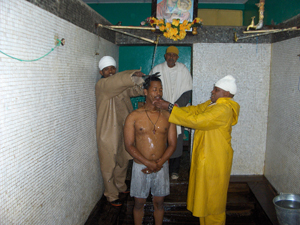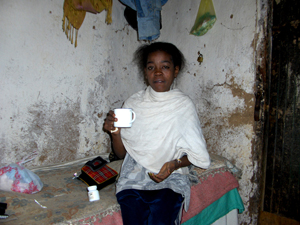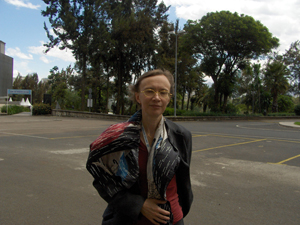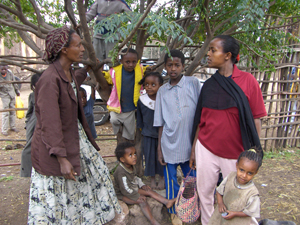CHIANG MAI, Thailand — Every evening, Jennie dresses up in her skintight miniskirt and baby T-shirt. She packs a dozen condoms in her purse before going off to a beer bar in town where she works. “These are the tool of my trade,” said the 36-year-old mother of two, pointing to the prophylactics. “I wouldn’t leave home without them.”
Jennie, a pint-sized woman with long, straight, copper-red hair, is one of thousands of commercial sex workers in Chiang Mai, a city in northern Thailand infamous for its flourishing sex trade. When HIV/AIDS began to spread through the country more than two decades ago, Chiang Mai was one of the areas hit hardest. A 1989 survey of the city’s sex workers showed that 44 percent were HIV-positive, and they spread the disease to so many customers that by 1991, the HIV infection rate among young men in northern Thailand was five times as high as in the rest of the country.
Today Jennie, who asked that her real name not be used, insisted in an interview that much has changed. “While customers know that they have to protect themselves against us, we also know that we have to protect ourselves against them, too,” she explained. “Sex workers are not murderers. We are as scared of AIDS as everybody else.”
Indeed, Thailand — the first Asian country to be devastated by HIV/AIDS in the 1980s and early 1990s — managed to achieve an almost miraculous rollback of the epidemic in the mid- to late 1990s, thanks in large part to zealousness in pushing a “100 percent condom” policy in Thailand’s vast, officially illegal but quietly condoned sex industry. With the Thai government by 1992 buying and distributing 60 million free condoms a year to sex workers and pressuring brothel owners to require their use, the number of new HIV infections fell from 143,000 in 1991 to about 20,000 in 2003.
But today, Thailand’s success story is in danger. Since the late 1990s, the Thai government has cut its HIV/AIDS prevention budget by nearly two-thirds. That has forced the Thai HIV/AIDS organizations and activists who do prevention work to look increasingly to foreign funding, including the President’s Emergency Plan for AIDS Relief, or PEPFAR, the Bush administration’s five-year, $15 billion effort to combat AIDS abroad.
However, despite having more than a half-million people infected with the virus — the biggest HIV-positive population in Southeast Asia — Thailand is being allocated only a small share of PEPFAR funding. And PEPFAR’s strategies, in particular its preference for promoting abstinence over condom use and its concern with the sex trade, have put local activists who reach out to sex workers in a difficult predicament. For sex workers such as Jennie, it means that increasingly, they must dip into their own meager incomes to buy condoms — or simply do without them.
At least partly as a result, public health experts fear that HIV/AIDS — which has claimed half a million lives in Thailand and remains the leading cause of death for 15- to 44-year-olds — may be on the resurgence. A 2005 World Health Organization report noted that the annual number of new infections is no longer declining as rapidly as it did during the 1990s and that other sexually transmitted diseases are on the rise, an indication that Thais are possibly being exposed to HIV as well. Another alarming sign: One-third to one-half of Thais newly infected with HIV in 2005 were women in stable relationships, suggesting that their male partners are engaging in risky activity with others. Combine that with increased risk of infection among intravenous drug users and among men who have sex with other men, and the future begins to look ominous.
Thai Parliament member Mechai Viravaidya, a longtime HIV/AIDS activist who has been nicknamed “Mr. Condom” for his efforts to promote prevention, delivered an even more blunt assessment in a May 2006 interview with The Nation, a Thai newspaper. “Thailand’s acclaimed achievements in HIV prevention are history,” said Mechai, who believes that the Thai government has doctored statistics to cover up an increase in HIV infections. “In the past three years people working in the field have realised the epidemic is back.”
‘No condom, no sex, no refund’
When HIV/AIDS spread to Thailand in the 1980s, officials initially tried to downplay the threat. Then epidemiologists discovered that the Thai sex industry had become a burgeoning breeding ground that threatened to spread the disease throughout the population. Thailand promptly changed course and made HIV/AIDS a national priority, increasing its prevention budget from just $188,000 in 1988 to more than $80 million in 1996.
In particular, the government focused its efforts on the sex-for-money trade. In 1991, it launched the “100 percent condom” program, with the goal of forcing sex workers and their customers to change their behavior. As medical researchers Robert Hanenberg and Wiwat Rojanapithayakorn wrote in a 1996 article, the effort’s core was a network of government health clinics — established conveniently close to red-light districts — that offered sex workers treatment for sexually transmitted diseases. Any sex worker who came into a clinic for a checkup was offered a free box of 100 condoms, and health authorities tracked infection cases back to the brothels where condoms were not being routinely used. Those establishments were put under pressure, sometimes by the Thai police, to conform to the new mandate.
Soon, brothel owners were posting signs reading “No condom, no sex, no refund,” and customers had no choice but to comply. According to Hanenberg and Rojanapithayakorn, the results were dramatic. The proportion of commercial sex acts in which condoms were used rose from around 15 percent before the epidemic struck to more than 90 percent by 1994, and the rate of HIV infection among female sex workers declined from more than 30 percent in the mid-1990s to less than 10 percent in 2004. The number of men visiting government clinics to get treatment for sexually transmitted diseases dropped by more than 90 percent between 1989 and 1995. By the Thai government’s own estimate, more than 5 million new HIV infections were prevented. Thailand’s promotion of condom use in the sex industry was so successful, in fact, that public health experts urged that it be emulated in other developing countries where the sex trade was commonplace.
Unfortunately, success bred complacency. Under Prime Minister Thaksin Shinawatra, who held office from 2001 until September 2006, when he was ousted in a military coup, priorities began to shift. Thaksin’s critics noted that he stayed away from meetings of the National AIDS Committee and made few references to the disease in his speeches to Parliament.
According to a 2005 report by the World Health Organization and the Thai Ministry of Public Health, Thai government spending on HIV/AIDS programs was frozen at about $40 million annually, and most of that money went to providing drugs and care for people living with HIV. Only 15 percent of the budget was allocated to prevention programs.
The government also began to close its free sexually transmitted disease clinics for sex workers, essentially disabling the system of tracking and preventing the spread of HIV in the sex industry. In Chon Buri province, which once had 11 STD clinics, only one remains to serve an estimated 14,000 sex workers. Worse yet, the once-vast government supply of free condoms began to be depleted, so that, according to the joint report, some Thai provinces received only 25 percent of their previous supply.
As a result, the joint report concluded ominously that “100 percent condom use is in a state of collapse in many areas,” leaving some sex workers unable to obtain condoms at all.
“Thailand’s past success came from extensive condom promotion,” said Nimit Tianudom, an official with the AIDS Access Foundation, a Thai nongovernmental organization (NGO). “When the government suddenly changed its policy and slashed the prevention budget, it resulted in a new round of infection as we are now experiencing.”
As the Thai government’s commitment to prevention has slipped, the more than 500 nongovernmental organizations working on HIV/AIDS in Thailand have tried to make up the difference. They range in size from the Raks Thai Foundation, an offshoot of CARE International, one of the world’s biggest philanthropic organizations, to Rejoice Charity, a group with an $110,000 annual budget whose workers still manage to distribute 15,000 free condoms each year, in addition to providing home health care to 170 Thais who are HIV-positive. Increasingly, such groups have had to look outside Thailand for money, to countries such as the United States.
Restrictions on funds discouraging — and sometimes unheeded
The U.S. government’s involvement in the Thai HIV/AIDS epidemic isn’t new. According to a State Department fact sheet, the U.S. Agency for International Development began funding HIV/AIDS projects in Thailand in the late 1980s, including epidemiological research and efforts to educate Thais vulnerable to the disease. In 2001, the U.S. even funded a program to design, develop and market a “high-quality, affordable” brand of condoms and water-based lubricant aimed at high-risk male youth, migrants, sex workers and drug users. In 2003, USAID opened a special office in Bangkok to supervise regional U.S.-funded HIV/AIDS efforts in Thailand and five other Mekong Delta area countries: Myanmar (Burma), Cambodia, China, Laos and Vietnam.
Nevertheless, the Bush administration didn’t select Thailand as one of the 15 “focus countries” that are the prime beneficiaries of the five-year, $15 billion PEPFAR plan — even though it has more than twice as many HIV-positive inhabitants as Vietnam, the one Asian country that was chosen. In an e-mail, State Department spokeswoman Kristin Pugh declined to explain the decision, except to say the selection process had multiple criteria, including the severity of the epidemic in a particular country, the commitment of a country’s government and how much funding for HIV/AIDS efforts was available from other international sources.
The U.S. did allocate a small slice of PEPFAR funds to Thailand in fiscal years 2004 through 2006 — $7.4 million in 2004, $7.6 million in 2005 and $7.4 million in 2006. (In contrast, Vietnam received $27.6 million in 2005 and $34 million in 2006.)
The U.S. government doesn’t publish a detailed breakdown of the projects that PEPFAR is supporting in Thailand. But one PEPFAR funding recipient that the U.S. government has publicized is the Human Development Foundation, a Bangkok-based nongovernmental organization founded in the 1970s by the Rev. Joe Maier, a Catholic priest, and Sister Maria Chantavarodom. The foundation’s Mercy Centre clinic provides antiretroviral drug treatment, which has transformed HIV/AIDS from a fatal condition to a manageable illness; basic health care; and, if needed, hospice care to more than 200 HIV-positive residents of impoverished Bangkok neighborhoods. It also offers a place to live for children who have been orphaned by the epidemic or are themselves infected with HIV. According to the organization’s Web site, it also conducts HIV/AIDS education courses and workshops, which aim to reach 11,000 high-risk people a year with basic information about prevention and to “disseminate compassion and understanding for those living with AIDS.”
Despite PEPFAR’s preference for promoting abstinence and faithfulness within relationships rather than condom use, Father Maier is pragmatic about the importance of condoms in fighting Thailand’s HIV/AIDS epidemic. “It’s not going to stop the AIDS crisis, but it is part of the solution,” Maier told the U.S. Catholic magazine earlier this year. “Of course, I’m in favor of condoms; I’m in favor of abstinence. … I’m in favor of anything that will work.”
But other nongovernmental organizations — particularly those that deal with sex workers — are struggling with what they see as an unrealistic U.S. disapproval not only of condom use but also of the sex industry in general. Organizations seeking PEPFAR funding must pledge their opposition to the sex trade, a condition imposed by conservative legislators when Congress passed the legislation funding PEPFAR in 2003.
A USAID contract with organizations that received grants, obtained by ICIJ, stipulates that any information the organization provides about condoms must be accompanied by information about failure rates. In addition, the contract warns the grantee that it cannot promote the legalization or practice of the sex trade, and “as a matter of policy it explicitly opposes, in its activities outside of the U.S., prostitution and sex trafficking.”
One Thai organization that chafed under these restrictions was the Raks Thai Foundation, which with its partner, CARE USA, initially sought PEPFAR funding for its HIV/AIDS prevention and care efforts in 2005. When the foundation, which works with illegal Burmese immigrants who become sex workers in northern Thailand, saw the restrictions in the contract sent by USAID, it took the unusual step of withdrawing its application.
The foundation’s executive director, Promboon Panitchpakdi, says that while he was aware of the U.S. position on condoms and the sex industry, “what made us decide to stop the deal was that we would have to accept these conditions as part of our organization policy.”
Another Thai organization, the Chiang Mai-based AIDS Access Foundation, chose to accept PEPFAR funding in 2005 but has decided not to seek any more U.S. money because it is uncomfortable with the restrictions in the U.S. contract, according to director Nimit Tienudom. He called the U.S. preference for abstinence and faithfulness over condoms unsuitable for a country where sex is widely for sale and intravenous drug use is rampant.
“It is simply impossible to tell people to stop having sex or stop using drugs,” Nimit said. “What we need here is to give people choices on how they can prevent AIDS. This includes condom use. The [abstinence and faithfulness] approach was created by conservatives who had no idea that the social context in Thailand differed from theirs.”
Other smaller NGOs, strapped for funds, say they have no choice but to accept U.S. money and try to find ways to work around the restrictions. Once such group is the Rainbow Sky Association, which works with men who have sex with other men — MSM, in HIV/AIDS parlance. In Bangkok in 2003, MSM had an HIV infection rate of more than 17 percent, according to the major joint study. Another joint study in 2005 showed the MSM infection rate among 16- to 21-year-olds was as much as 23 percent.
“Giving free condoms is essential for our work as it is a medium for discussion about AIDS,” said Rapeepun Jommaroeng, an official with Rainbow Sky. “In our work, we came across some MSMs who had never touched a condom before. A lot of people still need to learn more about protection; otherwise we may have to pay a high price in the future.”
With rising numbers of Thai women in seemingly stable relationships being infected by their male partners who visit brothels, engage in intravenous drug use or have sex on the sly with other men, it’s little wonder that Thai HIV/AIDS activists see a policy of promoting abstinence and faithfulness rather than condom use as hopelessly impractical. That’s why U.S.-based Family Health International, which obtains PEPFAR funding and then distributes it to smaller organizations such as Rainbow Sky, chooses to interpret the guidelines more loosely.
Dr. Somchai Sriplienchan, the organization’s director in Thailand, said that while its sub-grantees sign a contract requiring them to promote abstinence and faithfulness, “we made it clear to them that they are the ones who decide how they work with their target groups about it. It doesn’t mean that they have to push for abstinence first — we know that some groups cannot do that.”
Vacationers’ lasting memories
Meanwhile, in Chiang Mai, the sex workers who work the city’s bars and brothels have yet another problem. The police, who once merely pressured brothel owners to insist on condom use, are now raiding the brothels and using condoms as evidence that the sex trade is taking place. As a result, managers of the bars and brothels, who once stockpiled condoms for their workers, are no longer doing so. (See sidebar.)
“We keep no more condoms in our place,” said Yai, who asked that her real name not be used, a 34-year-old manager of a small brothel. According to her, previous owners of six brothels in her area received condoms from clinics that operated under the Public Health Ministry in the province. But after a few raids in the past year and a half, they decided it was too risky to keep such incriminating items on the premises.
With 11 percent of female sex workers and 8 percent of male sex workers already HIV-positive in 2003, Thailand’s condom crisis increases the risk that HIV/AIDS will spread outside the confines of the sex industry — and, perhaps, far beyond the borders of Thailand itself. As the Bangkok Post recently reported, in faraway Finland, that nation’s Ministry of Health is projecting a doubling of the rate of new HIV infections over the next five years — due in part to Finnish tourists’ interaction with sex workers while on vacation in Thailand.




